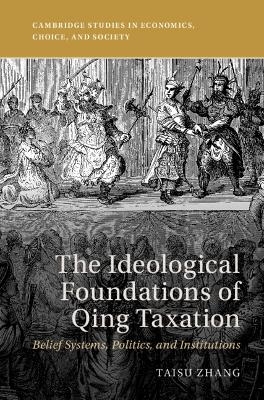
The Ideological Foundations of Qing Taxation
Belief Systems, Politics, and Institutions
Seiten
2023
Cambridge University Press (Verlag)
978-1-316-51868-7 (ISBN)
Cambridge University Press (Verlag)
978-1-316-51868-7 (ISBN)
This survey of the fiscal history of China's last imperial dynasty explains why its ability to tax was unusually weak. It argues that the answer lies in the internal ideological worldviews of the political elite, rather than in external political or economic constraints.
How states develop the capacity to tax is a question of fundamental importance to political science, legal theory, economics, sociology, and history. Increasingly, scholars believe that China's relative economic decline in the 18th and 19th centuries was related to its weak fiscal institutions and limited revenue. This book argues that this fiscal weakness was fundamentally ideological in nature. Belief systems created through a confluence of traditional political ethics and the trauma of dynastic change imposed unusually deep and powerful constraints on fiscal policymaking and institutions throughout the final 250 years of China's imperial history. Through the Qing example, this book combs through several interaction dynamics between state institutions and ideologies. The latter shapes the former, but the former can also significantly reinforce the political durability of the latter. In addition to its historical analysis of ideological politics, this book makes a major contribution to the longstanding debate on Sino-European divergence.
How states develop the capacity to tax is a question of fundamental importance to political science, legal theory, economics, sociology, and history. Increasingly, scholars believe that China's relative economic decline in the 18th and 19th centuries was related to its weak fiscal institutions and limited revenue. This book argues that this fiscal weakness was fundamentally ideological in nature. Belief systems created through a confluence of traditional political ethics and the trauma of dynastic change imposed unusually deep and powerful constraints on fiscal policymaking and institutions throughout the final 250 years of China's imperial history. Through the Qing example, this book combs through several interaction dynamics between state institutions and ideologies. The latter shapes the former, but the former can also significantly reinforce the political durability of the latter. In addition to its historical analysis of ideological politics, this book makes a major contribution to the longstanding debate on Sino-European divergence.
Taisu Zhang is Professor of Law and History at Yale University.
1. A short history of qing taxation; 2. The uses and limitations of rationalist explanations; 3. Pre-qing fiscal regimes; 4. The early qing paradigm shift; 5. Mid-qing entrenchment; 6. Late qing reforms; 7. Theoretical implications.
| Erscheinungsdatum | 30.01.2023 |
|---|---|
| Reihe/Serie | Cambridge Studies in Economics, Choice, and Society |
| Zusatzinfo | Worked examples or Exercises |
| Verlagsort | Cambridge |
| Sprache | englisch |
| Maße | 158 x 235 mm |
| Gewicht | 800 g |
| Themenwelt | Geschichte ► Teilgebiete der Geschichte ► Wirtschaftsgeschichte |
| Wirtschaft ► Volkswirtschaftslehre ► Makroökonomie | |
| ISBN-10 | 1-316-51868-X / 131651868X |
| ISBN-13 | 978-1-316-51868-7 / 9781316518687 |
| Zustand | Neuware |
| Haben Sie eine Frage zum Produkt? |
Mehr entdecken
aus dem Bereich
aus dem Bereich


